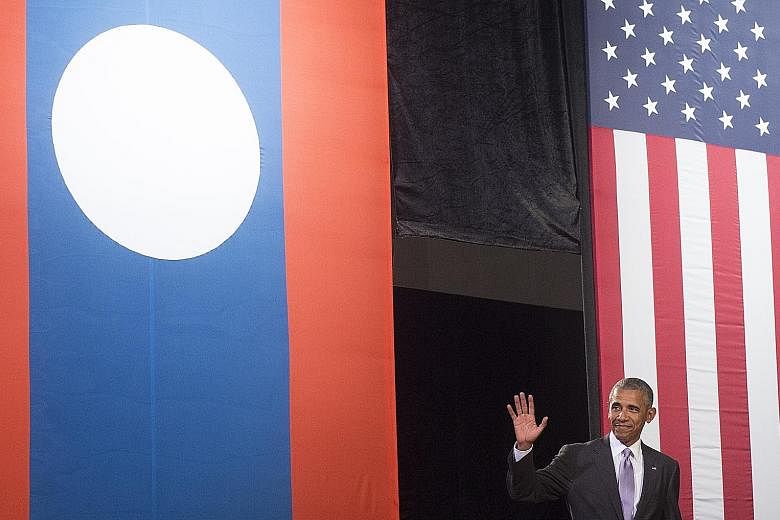US President Barack Obama has said his country's commitment to the Asia-Pacific region will endure "for the long term", as he reiterated a vow to push Congress to pass the Trans-Pacific Partnership (TPP) trade pact before he leaves office.
The United States' interests in the Asia-Pacific are "not a passing fad", Mr Obama said yesterday in the Laotian capital of Vientiane on his last trip to Asia as president. "It reflects fundamental national interests."
He acknowledged that a failure to follow through on the 12-nation TPP deal would call into question the US "rebalance" towards Asia.
The "TPP is a core pillar of America's rebalance to the Asia-Pacific. And the trade and the growth it supports will reinforce America's security alliances and regional partnerships", he said at the Lao National Cultural Hall to about 1,000 people.
"Failure to move ahead with TPP will not just have economic consequences, but call into question America's leadership in this vital region," he said.
Singapore Institute of International Affairs head Simon Tay said the TPP "is every bit as significant as military engagement and more enduring", adding: "It causes the Chinese more concern than anything else."
Mr Obama was on a visit to Laos before attending tomorrow's East Asia Summit, an annual gathering of state leaders held after the Asean Summit, here in Vientiane.
Since he came to power in 2009, his foreign policy has been characterised by its rebalance to Asia, where the superpower has tried to grow economic and strategic ties while trying to dial down military interventions in Iraq and Afghanistan.
In February, he hosted a special standalone summit for Asean leaders in Sunnylands, California, where they reaffirmed key principles guiding Asean-US cooperation, including respect for a rules-based order.
Mr Obama, the first US president to visit Myanmar in 2012, lifted a lethal arms embargo on Vietnam, its one-time enemy, and ramped up military aid to a Philippines trying to boost maritime capabilities to assert its claims over contested territory in the South China Sea. Parts of this key waterway are also claimed by Vietnam, Malaysia and Brunei, while China and Taiwan separately claim nearly the entire resource-rich sea.
"The United States is more deeply engaged across the Asia-Pacific than we have been in decades," Mr Obama said yesterday. "We have sent a clear message that as a Pacific nation, we are here to stay. In good times and bad, you can count on the United States of America."
By the end of the decade, he said, the majority of the US' navy and air force fleets will be based out of the Pacific. Already, it has deployed more of its most advanced military capabilities in the region.
There are some, including in China, who see the US rebalance as an attempt to contain the rise of China, which has been cementing its dominance in the region through investment, trade and aid as well as military build-up in the South China Sea.
China, which has created outposts out of large islands it reclaimed from contested reefs, has refused to recognise the result of a July arbitral tribunal ruling, in a case brought by the Philippines, which invalidated China's historical claims in the South China Sea.
The US has conducted freedom of overflight and navigation operations close to China-claimed islands to challenge what it sees as its excessive maritime claims. Their rivalry in the region and differences have prompted some to ask if the two may be headed for confrontation.
Allaying such worries, Mr Obama said the US has worked "to build a constructive relationship" with China. The "two governments continue to have serious differences in important areas", but have shown that they can work together to advance mutual interests, like denuclearising the Korean peninsula.
"The United States welcomes the rise of a China that is peaceful and stable and prosperous and a responsible player in global affairs," he said, "because we believe that that will benefit all of us."

